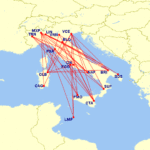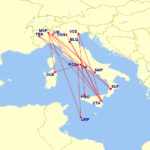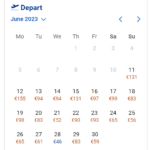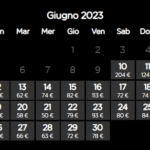Ultra low-cost carrier (ULCC) Wizz Air has officially put on sale, last week, its Wizz MultiPass — which it claims is «the first airline subscription program in Europe». Powered by Barcelona’s Caravelo, which specializes in subscription programs, it will allow customers to fly once a month, in select markets, for a fixed fee.
Initially, the Hungarian airline is offering the product in two markets; international flights to and from Poland and domestic flights in Italy.
In a press release, Wizz Air remarked the program will allow customers to book flights using the subscription also during peak Summer season, subject to availability of seats, up to five days before the flight.
The most basic bundle in Italy will give the right for a monthly segment for EUR37 in the most basic fare. The most expensive, at EUR164, gives passengers a monthly roundtrip with the «Wizz Priority» service (ie the right for a cabin bag) and a 20 kg dispatched bag.
How to interpret this move?
Benefits of airline subscriptions may seem clear, particularly for low-cost carriers. It provides airlines a constant, predictable stream of revenue; at the same time, it creates potential brand loyalty.
Yet, whether it is because they think their low fares are enough to lure passengers (and keep them loyal to those low fares) or because they are afraid of adding complexity into their system, not many low-cost carriers have ever adopted it. In fact, Wizz is the first one to try it in Europe. Market conditions may have prompted the Budapest airline to think out of the box.
The reasons why Poland was chosen are not very clear. In that market, Ryanair overtook Wizz to become the country’s largest discount airline by number of seats in early 2012, according to capacity data by Cirium’s Diio Mi application. Wizz has been trailing the Irish airline relatively closely since then.
Pitching Italy as an initial market for the MultiPass, meanwhile, sounds much easier. Since 2020, Wizz has had ambitious growth plans for the country, which initially comprised of an important domestic presence.
With stiff domestic competition domestically, Wizz Air decided to shift its capacity into larger bases — namely Milan/Malpensa and Rome/Fiumicino –, particularly into international routes where it faced less competition. Such developments were previously reported by Aviacionline.
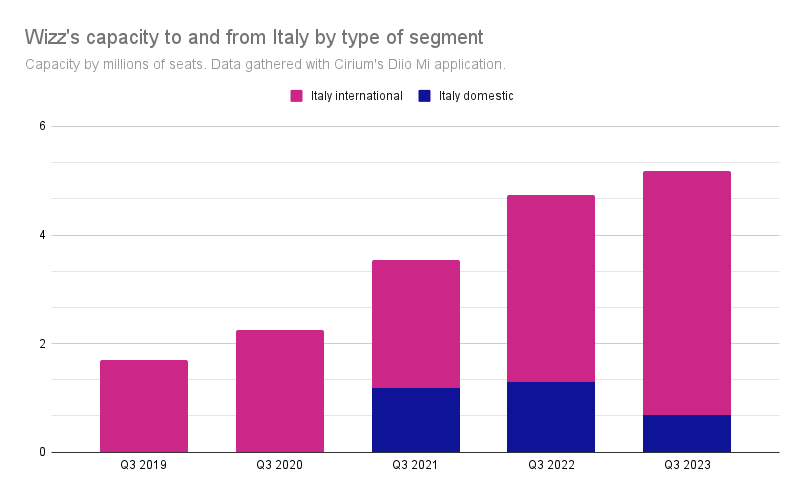
The maps below, comparing Wizz Air’s domestic network in Italy in July 2022 (left) and in July 2023 (right) show the scale of the downsizing.
Still, the Hungarian ULCC keeps serving some trunk routes, such as Catania-Milan/Malpensa, still facing a high level of competition.
And while the aircraft it uses — the A321neo — may provide a low unit cost for its higher number of seats, 239, it is also more difficult to sell that many tickets on any given flight. Ryanair’s 737-800 and 737 MAX 8200 have 189 and 197, respectively, and easyJet’s A320 have 186.
This puts a downward pressure in fares. A quick (and highly non-scientifical) search into the three LCC websites for a Malpensa-Catania for the remainder of June may well depict that.
In other words: even for close-in dates (in this very narrow and anecdotal sample), Wizz’s lowest fares are lower than its discount competitors’. So this may be a good reason why the MultiPass should be trialed in the Italian domestic market.
Wizz claims, in its press release, that passengers who subscribe to the plan may save up to 50% in a Milan-Catania ticket this Summer — «a great opportunity considering the peak Summer season, particularly for passengers who need to travel frequently throughout Italy».
While for the frequent traveler this may sound like a great deal, this is what makes the ULCC and the subscription model a good match. The EUR37 base price of the MultiPass is relatively close to Wizz Air’s average fare of EUR39.70 in its financial year ended in March. With the program, it appears that Wizz believes it can increase volumes and loyalty in very competitive markets without leaving much money in the table, if any.



